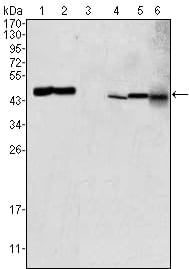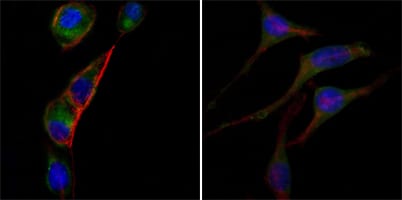

| WB | 1/500 - 1/2000 | Human,Mouse,Rat |
| IF | 咨询技术 | Human,Mouse,Rat |
| IHC | 咨询技术 | Human,Mouse,Rat |
| ICC | 1/200 - 1/1000 | Human,Mouse,Rat |
| FCM | 咨询技术 | Human,Mouse,Rat |
| Elisa | 1/10000 | Human,Mouse,Rat |
| Aliases | KAT4; KATIV; mitAAT |
| Entrez GeneID | 2806 |
| clone | 3E9 |
| WB Predicted band size | 47kDa |
| Host/Isotype | Mouse IgG1 |
| Antibody Type | Primary antibody |
| Storage | Store at 4°C short term. Aliquot and store at -20°C long term. Avoid freeze/thaw cycles. |
| Species Reactivity | Human,Mouse,Rat,Monkey |
| Immunogen | Purified recombinant fragment of human GOT2 expressed in E. Coli. |
| Formulation | Purified antibody in PBS with 0.05% sodium azide. |
+ +
以下是关于GOT2抗体的3篇参考文献,包含文献名称、作者及摘要内容概述:
---
1. **文献名称**:*Mitochondrial aspartate aminotransferase (GOT2) promotes cancer cell proliferation and metastasis in hepatocellular carcinoma*
**作者**:Li Y, et al.
**摘要**:研究通过免疫组化(使用GOT2特异性抗体)发现,GOT2在肝癌组织中高表达,并通过调控谷氨酰胺代谢促进肿瘤细胞增殖和转移。
---
2. **文献名称**:*GOT2 regulates redox homeostasis and supports colorectal cancer progression via mTORC1 signaling*
**作者**:Wang X, et al.
**摘要**:利用GOT2抗体进行Western blot和免疫荧光实验,证明GOT2通过维持线粒体氧化还原平衡激活mTOR通路,从而促进结直肠癌发展。
---
3. **文献名称**:*The role of mitochondrial GOT2 in cellular metabolism: Insights from CRISPR/Cas9 knockout models*
**作者**:Smith J, et al.
**摘要**:通过敲除GOT2基因并结合抗体检测蛋白表达,揭示了GOT2在天冬氨酸-苹果酸穿梭中的作用,及其对细胞能量代谢的关键影响。
---
如需更具体的文献年份或期刊信息,可进一步补充关键词或研究场景。
The GOT2 antibody targets glutamate oxaloacetate transaminase 2 (GOT2), a mitochondrial enzyme encoded by the *GOT2* gene. Also known as aspartate aminotransferase 2 (AST2), GOT2 plays a critical role in cellular metabolism by catalyzing the reversible conversion of aspartate and α-ketoglutarate to oxaloacetate and glutamate. This reaction is integral to the malate-aspartate shuttle, which facilitates NADH transport across mitochondrial membranes, linking glycolysis with the tricarboxylic acid (TCA) cycle. GOT2’s function is vital for amino acid metabolism, gluconeogenesis, and maintaining redox balance in mitochondria.
GOT2 antibodies are widely used in research to study the enzyme’s expression, localization, and role in diseases. Dysregulation of GOT2 has been implicated in metabolic disorders, cancer, and neurodegenerative diseases. For instance, altered GOT2 levels are observed in hepatocellular carcinoma, where mitochondrial metabolic reprogramming supports tumor growth. Similarly, its involvement in glutamate metabolism links it to neurological conditions like Alzheimer’s disease.
Researchers employ GOT2 antibodies in techniques such as Western blotting, immunohistochemistry, and immunofluorescence to assess protein expression patterns in tissues or cultured cells. These studies help elucidate GOT2’s interaction with metabolic pathways, its response to oxidative stress, and potential therapeutic targets. Recent studies also explore its role in ferroptosis and mitochondrial dysfunction, highlighting its broader implications in cellular homeostasis and disease mechanisms.
×